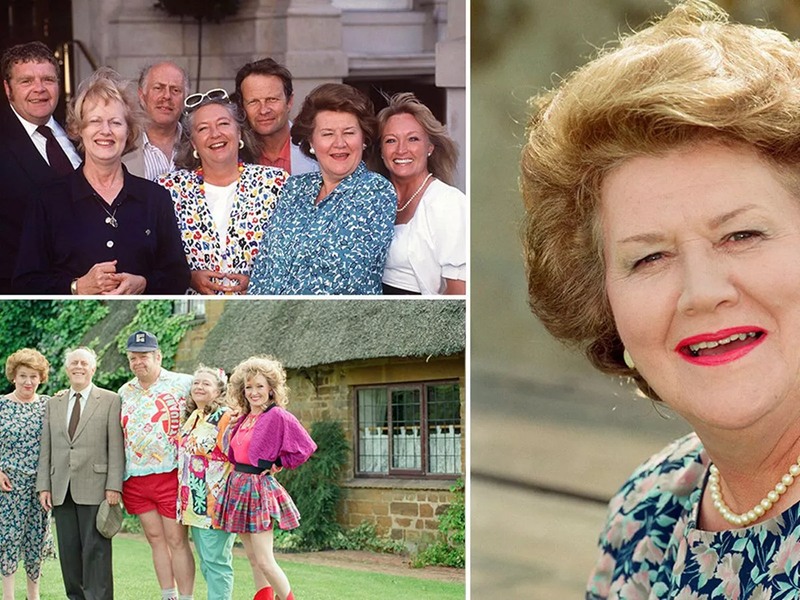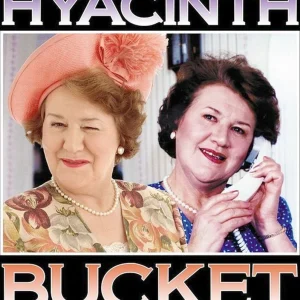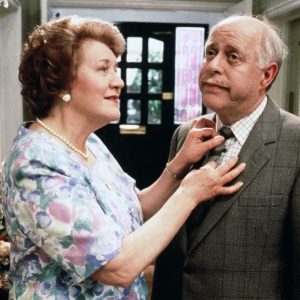“The Ghost in the Parlor: Unmasking the Tragic Heart of Keeping Up Appearances“
In the pantheon of British sitcoms, Keeping Up Appearances is often remembered for its gentle farce and impeccable comedic timing. Patricia Routledge’s portrayal of Hyacinth Bucket—“It’s Bouquet!” she insists—became iconic, a pitch-perfect embodiment of social aspiration, class anxiety, and suburban repression. But beneath the surface of doilies, bone china, and candlelight suppers lies a story far more tragic, even gothic. A ghost haunts the halls of Hyacinth’s obsessively curated home—not just metaphorically, but perhaps literally. And it is this spectral presence that may be the key to understanding the twisted emotional landscape of the Bucket family.
Sheridan: The Ghost Son
Sheridan, Hyacinth and Richard’s enigmatic son, is seldom seen and yet ever-present. He is constantly referenced—usually on the phone, asking for money—and often cloaked in a vague ambiguity, particularly around his sexuality. He’s studying “needlework and design” and is perpetually low on cash. But here’s the twist: what if Sheridan is not alive at all?
This theory, echoing the emotional architecture of Who’s Afraid of Virginia Woolf?, suggests that Hyacinth and Richard have been in denial for decades. Much like George and Martha’s imaginary child in Albee’s play, Sheridan may be a figment of grief-stricken fantasy—a ghost born from the trauma of parental loss. In this version of events, Sheridan died young, and his parents, unable to confront the unbearable truth, crafted a version of him who is always just out of frame, calling in from university, asking for money, and hinting at his identity in ways they can eternally “accept.”
It’s a loop of penance, where each imaginary call is a chance to be better parents—to support him unconditionally in the way they never could when he was alive. Whether it’s their discomfort with his sexuality or his perceived extravagance, Sheridan becomes the vessel for all their unresolved guilt and regret.
A Universe of Denial: From Rumpole to the Roses

But this haunted house is part of a larger universe. The theory that Keeping Up Appearances shares its fictional world with Rumpole of the Bailey adds a fascinating meta-layer. Observers have noted eerie similarities between Hyacinth and Hilda Rumpole—both stern-voiced women obsessed with class mobility, who refer to their fathers as “Daddy” in nearly identical tones. The casting of Peggy Thorpe-Bates in Rumpole (at one point resembling Routledge from certain angles) and the thematic overlap between the two women raises the intriguing possibility of a shared lineage.
One fan theory even posits that Hyacinth is Hilda’s niece, and the women’s obsessive social climbing is not merely personality quirk, but inherited dysfunction—a generational curse of sorts, passed down along with the relentless drive to “better oneself” no matter the emotional cost.
The Sisters Bouquet: A Fractured Floral Arrangement
The name “Bouquet” may be more than a punchline—it could be a clue. With sisters named Rose, Daisy, Violet, and Hyacinth, the floral theme is too deliberate to ignore. While the prequel Young Hyacinth claims the family’s surname is Walton, many fans prefer the idea that their maiden name was in fact “Bouquet,” giving Hyacinth a plausible excuse for her pretentious pronunciation.
But what truly binds these sisters is not nomenclature—it’s trauma. Take a closer look at their adult lives, and a darker picture emerges. Violet, the wealthiest, is married to a man who’s either gay or possibly trans, and their marriage seems more like a transaction than a romance. Rose is overtly sexual and unstable, flitting between disastrous affairs. Daisy is perpetually depressed, stuck in poverty, with no apparent drive to escape it.
Hyacinth, meanwhile, compensates with rigid propriety and social aspiration, constructing a fortress of etiquette and appearances to ward off the chaos she fears lurks beneath. The underlying theory? Their behavior is symptomatic of childhood abuse.
Daddy: The Unspoken Horror
In the series, “Daddy” is a recurring off-screen character, often used for comedic effect. He’s always getting into trouble, chasing women, and creating a general nuisance. But when viewed through a darker lens, these antics take on a disturbing hue.
The suggestion that “Daddy” molested his daughters in childhood is certainly a grim one, but it would explain the pervasive dysfunction within the family. Hyacinth’s desperate need to control every detail of her life, Rose’s hypersexuality, Violet’s unorthodox marriage, and Daisy’s depression all align with common psychological outcomes of childhood abuse.
Even Hyacinth’s reluctance to let Daddy live with her, despite her obsession with appearances and family duty, hints at buried shame. She always finds an excuse for why he cannot stay, despite insisting on moral superiority in every other domain. It’s the clearest tell of all: she’s hiding something unspeakable beneath the lace doilies and Royal Doulton.
Climbing the Ladder to Nowhere
Hyacinth’s relentless pursuit of upward mobility, once played for laughs, becomes tragic when seen through this prism. Young Hyacinth shows us a girl raised in poverty, desperate to escape her past. And she does—sort of. Her marriage to Richard provides a stable, middle-class existence, but it’s never enough. Not when Violet has a Mercedes and a sauna. Not when there’s always someone else to impress. If Hyacinth ever reaches the upper class, she’ll only move the goalposts again, dreaming of aristocracy and peerage.
Her social climbing isn’t driven by snobbery alone—it’s survival. If she can become someone else entirely, perhaps she can forget who she used to be. Perhaps she can bury what happened. But like any good ghost story, the past refuses to stay buried.
The Tragedy Behind the Teacups
Keeping Up Appearances was never meant to be a psychological thriller. Its enduring popularity rests on its gentle satire and timeless performances. But like all great art, it reflects the complexity of human experience. The genius of the show lies in its ability to veil tragedy in comedy, pain in politeness, and horror in hand-embroidered tablecloths.
Maybe Sheridan really is just away at university, eternally broke and vaguely artistic. Maybe “Daddy” is just an eccentric old man. But the shadows between the lines suggest otherwise. In the world of Keeping Up Appearances, appearances are everything—and that might be the saddest truth of all.
Would you like a shorter version of this for social media or a quote-style teaser?





